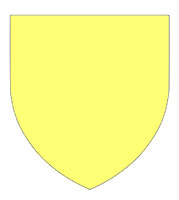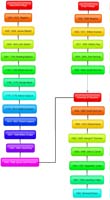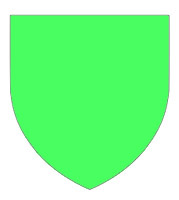| Professors of Natural Philosophy at the Universities of Aberdeen |
Dr William Knight LLD 17th Sep 1786 - 3rd Dec 1844Like his predecessors Duncan, Skene and Copland, William Knight was a Marischal College graduate. In fact his student notes of Copland's course in 1800-01 that are now in the library are one of the best sets of such notes. He graduated at the age of 15. Knight had wide-ranging interests. He lectured in Marischal College on Natural History in 1810-11 and narrowly missed being elected Professor in that subject in 1811. He gave extra-mural classes from 1811 - 1816 on Botany and Chemistry and many years later continued his summer botany classes. He published books on botany and geology . In 1816 Knight was appointed Professor of Natural Philosophy at the Belfast Academical Institution, then both a school and university. At the start of the 1822 session at Marischal College, Knight acted in lieu of the dying Copland and he was appointed Copland's successor on 20th Feb 1823. Knight's name is now known to many scholars not for his natural philosophy but for his painstaking collection of detail relevant to the history of Marischal College. Covering multiple bound volumes, he copied text from historic sources including ephemera that are no longer available. As a result the 'Knight manuscripts' are an invaluable historical resource. His natural philosophy teaching seems to have followed the lines of that of his predecessor, being well illustrated with demonstrations and fairly light on mathematics - perhaps more fun than some current courses! His lectures were like an exceedingly interesting and well-arranged scientific encyclopaedia for moderately mathematical readers. He didn't have the technical skill of Copland so 'bought in' such new demonstrations as the College could afford. In the words of a former pupilTwo sympathetic reminiscences of Knight can be found in [Prof.] David Masson "Memories of two cities: Edinburgh and Aberdeen" reprints of articles in the 1860s, Oliphant, Edinburgh, 1911 and 7 short pieces by [Prof.] Alexander Bain in Alma Mater, vol. 6, 1888.: He lectured to his class either from his desk, where he would read continuously from the manuscript through a gold-mounted double eyeglass held lightly between his forefinger and thumb, and often removed so that he could survey the class freely and yet not lose the thread of his reading, or else from the floor, to which he would frequently descend so as to be near the apparatus table, and where he would generally speak extempore without book or eyeglass. ... the presentation of it was singularly lucid, and it was all then very stimulating and new [to the students]. Others commented how well ordered and neat his presentation was. In addition, he made us give in every week a written essay on some subject recently discussed in the class, compelling us to punctuality by a fine in case of default. The essays were all returned at the end of the session, whether read by him or not (for there were some fifty or sixty every week) may be left to conjecture. Fines were a feature of student life, extracted for lateness (two pence) and talking in class, interrupting or bad behaviour (half-a-crown, equivalent to 30 pence, no mean amount). This 'rogue money' built up to a considerable amount over a year which Knight devoted to class prizes. During Knight's tenure a Royal Commission investigated the potential for the merger of King's College and Marischal College into a single University. The Professors then were largely in favour of retaining two Professors in the key subjects. The merger didn't happen on this occasion. Among the evidence collected were the oaths administered upon students being awarded their Masters of Arts. The Marischal degree still reflected the Protestant background of its founder, including the words Papæ Romani tyrannidem abhorrere, omnesque Romanas hæreses odio habere - a reminder now that prejudice ran deep two centuries ago. King's College, founded under Papal Bull, of course included no such admonition. Knight is another of our professors who is buried in St Nicholas Churchyard. His well engraved pink-granite stone lies on the south side of the church near the door. A lengthy inscriptionUnder this stone lie the remains of the following, namely/ William Knight bookseller in Aberdeen, born 1751, died 15 June 1819./ Janet Hoyes, wife of the above born/ 1746, died 13 December 1822./ William Knight. LL.D. son of the above, born/ 17 September 1786, died 3 December 1844. From/ 1816 to 1822 Professor of Natural Philosophy in/ the Belfast Institution, and Professor of the/ same subject in Marischal College Aberdeen/ from 1822 to 1844./ Jean Glennie, wife of Dr Knight and/ daughter of George Glennie D.D., Professor/ of Moral Philosophy and Logic in Marischal/ College Aberdeen one of the most amiable of women/ and the most affectionate of mothers born 5/ October 1798, died 3 March 1846./ Also the following children of the foresaid/ Dr. Knight and Jean Glennie, namely/ Jane born 19 April 1825, died 12 March 1846./ William, born 17 August 1828, died 11 June 1850./ Janet, born 19 September 1823, died 18 November 1856./ Margaret, born 26 June 1822, died 27 February 1908. commemorates his parents, himself and his wife, 3 daughters and a son.. |
 William Knight, with permission, from an image in Aberdeen University Museums & Archives ABDUA 31696. Knight was described as of light complexion, middling height but appearing short due to the roundness of his figure. He had, apparently, a defining thin, shrill, high voice but was noted for being uncommonly strong. William Knight, with permission, from an image in Aberdeen University Museums & Archives ABDUA 31696. Knight was described as of light complexion, middling height but appearing short due to the roundness of his figure. He had, apparently, a defining thin, shrill, high voice but was noted for being uncommonly strong. |
|
Page by John S. Reid Dec. 2017 |


